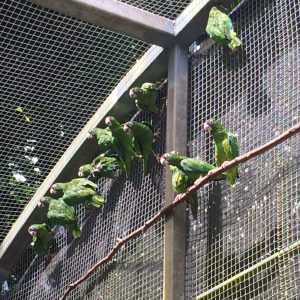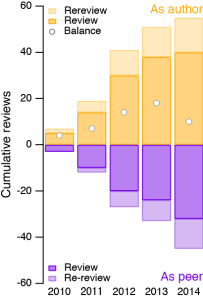A couple of months ago Micah J. Marty and I had a twitter conversation and subsequent email exchange about how citations worked with preprints. I asked Micah if I could share our email discussion since I thought it would be useful to others and he kindly said yes. What follows are Michah’s questions followed by my responses. At the level of the journal nothing happens.
Postagens de Rogue Scholar

The transition for scientific journals from print to online has been slow and painful. And it is not yet complete. This week I got an RSS alert to a “new” paper in Oncogene.

Last week, ALM (article-level metric) data for PLoS journals were uploaded to Figshare with the invitation to do something cool with it. Well, it would be rude not to. Actually, I’m one of the few scientists on the planet that hasn’t published a paper with Public Library of Science (PLoS), so I have no personal agenda here. However, I love what PLoS is doing and what it has achieved to disrupt the scientific publishing system.
I recently was sent a report from a university-wide working group on the publishing habits within the Freie Universität Berlin. I don’t think this document is available online, but I think I’m not doing anything illegal if I publish some of the survey results here. The working group polled all faculty members of the university on various questions concerning scholarly publishing.

Despite the precipitous drop in the price of DNA sequencing, global credit crunches have shrunk the science budgets able to properly take advantage of this. At least in the case of non-medical research.
Arguably, there is little that could be more decisive for the career of a scientist than publishing a paper in one of the most high-profile journals such as Nature or Science . After all, in this competitive and highly specialized days, where a scientist is published all too often is more important than what they have published.

A colleague once told me that they only review three papers per year and then refuse any further requests for reviewing. Her reasoning was as follows: I publish one paper a year (on average) This paper incurs three peer reviews Therefore, I owe “the system” three reviews. It’s difficult to fault this logic. However, I think that as a senior scientist with a wealth of experience, the system would benefit greatly from more of her input.
As announced by Noam Ross on Twitter (and confirmed by the Editor in Chief of Ecology Letters), Ecology Letters will now allow the submission of manuscripts that have been posted as preprints. Details will be published in an editorial in Ecology Letters. I want to say a heartfelt thanks to Marcel Holyoak and the entire Ecology Letters editorial board for listening to the ecological community and modifying their policies.
My post on the strange data underlying the new impact factor for eLife was read by many people. Thanks for the interest and for the comments and discussion that followed. I thought I should follow up on some of the issues raised in the post. To recap: eLife received a 2013 Impact Factor despite only publishing 27 papers in the last three months of the census window. Other journals, such as Biology Open did not.

I noticed something strange about the 2013 Impact Factor data for eLife . Before I get onto the problem. I feel I need to point out that I dislike Impact Factors and think that their influence on science is corrosive. I am a DORA signatory and I try to uphold those principles. I admit that, in the past, I used to check the new Impact Factors when they were released, but no longer.